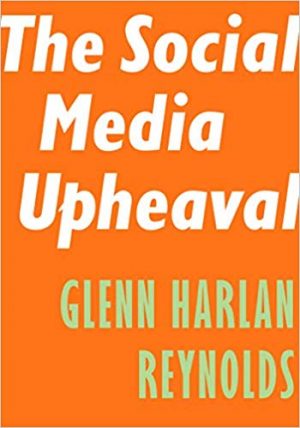Everyone, it seems, uses Facebook and Twitter…and hates them. The Left hates them because the Russians used them to steal the 2016 presidential election from Hilary Clinton and give it to Donald Trump. (That’s the allegation anyway, highly improbable in my opinion.) The Right hates them because they censor and deplatform conservative speech. (A more probable allegation, in my opinion.) And because everyone hates them, everyone wants to reform them.
The Social Media Upheaval by Glenn Harlan Reynolds explains why social media have become so powerful and so hated in the last decade, as well as how to ameliorate their worst features. Reynolds is the Beauchamp Brogan Distinguished Professor of Law at the University of Tennessee. He blogs at InstaPundit.com—he’s known as the “Blogfather” whose links to other sites cause “Instalanches” of sudden, high-volume web traffic. He writes for such publications as The Atlantic, Forbes, Popular Mechanics, The Wall Street Journal, and USA Today. He lives in Knoxville, Tennessee.
The basic problem with social media, in Reynolds’ telling, is their design. “It’s almost as if the social media world was designed to spread viruses of the mind,” he writes, then cites Jaron Lanier’s work on “engagement.” As Lanier writes, “Engagement is not meant to serve any particular purpose other than its own enhancement, and yet the result is an unnatural global amplification of the ‘easy’ emotions, which happen to be the negative ones.” Combine the negative emotions with social media’s bandwagon effect and the tendency of users not to read past headlines, and you find that, in Reynolds’ words, “Social media makes people less informed but more partisan.”
That’s bad enough, but then you have to factor in the monopolistic nature of current social media. In the early days of the internet, blogs and chat boards existed at individual domains that you had to separately visit. Now, you never have to leave Facebook. There’s a clear upside to this, of course—ease of use. The downside is when Facebook begins to regulate who or what can make use of its platform. The same goes for Twitter and like-minded social media.
Because of this corporate censorship, deplatforming, and demonetization, some—such as Sen. Josh Hawley—have urged legislation to regulate content in a variety of ways. Reynolds has doubts about that from a First Amendment perspective, which I share. Instead, he urges legislation based on antitrust principles. He writes: “Policing platforms, and collusion among them…is likely to do more good than censorship. Antitrust scrutiny of monopolies and collusion will do more for the integrity of social media, and the protection of society from hysteria and misinformation, than regulation of content. And such antitrust regulation doesn’t raise the same First Amendment and free speech problems.”
At 64 pages, The Social Media Upheaval is a quick read and valuable for precisely that reason. If you’re worried about the negative effectives social media is having on American public discourse (and mental health), read it.
Book Reviewed
Glenn Harlan Reynolds, The Social Media Upheaval(New York: Encounter Books, 2019).
P.S. If you liked my review, please click “Helpful” on my Amazon review page.

